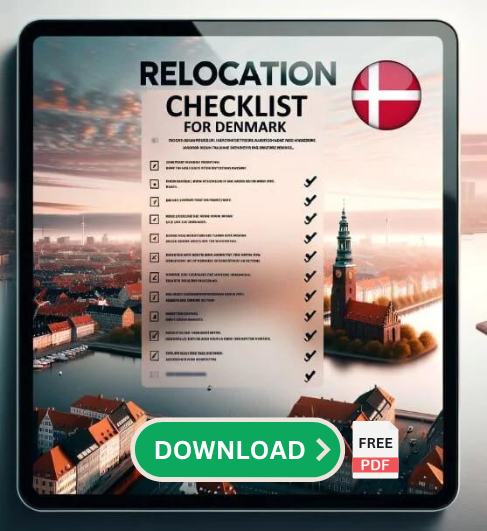Becoming a citizen of any country is a significant milestone. In Denmark, it represents not only a commitment to the rich history, culture, and values of the nation but also opens up a plethora of benefits and opportunities. As one of the world's most developed countries, Denmark offers its citizens a high standard of living, robust healthcare and educational systems, and a strong sense of community.
This article will guide you step-by-step on how to apply for Danish citizenship. Whether you've been in Denmark for years or are just starting your journey, understanding the path to citizenship can be invaluable.
Key Takeaways
- Acquiring Danish citizenship involves understanding eligibility criteria and necessary documentation.
- Mastery of the Danish language and passing the integration test are pivotal for approval.
- The application procedure is systematic, requiring attention to detail and patience.
- Once approved, taking the Oath of Allegiance and Loyalty is a crucial final step.
- Post-approval processes, like obtaining a Danish passport, cement your new status.
- Potential challenges, like the language barrier, can be navigated with the right resources.
Benefits of Danish Citizenship

While being a resident in Denmark already provides numerous advantages, obtaining citizenship deepens your connection to the country and provides enhanced rights:
- Right to Vote: As a Danish citizen, you can participate in local and national elections, allowing you to have a voice in shaping the country's future.
- EU Benefits: Holding a Danish passport lets you travel, work, and live anywhere within the European Union without requiring additional visas or permits. This facilitates easier travel and broadens job opportunities across the continent.
- Security: Citizenship provides a more permanent status than a residency permit, which means there's no need for periodic renewals or fear of potential changes in immigration policies affecting your stay.
- Access to Public Office: If you're politically inclined, Danish citizenship allows you to hold public office, further integrating you into the fabric of the community.
How to Apply for Danish Citizenship: Eligibility Criteria
Gaining citizenship in Denmark involves fulfilling certain prerequisites. Before initiating the application process, it's crucial to understand and ensure that you meet these requirements. Doing so can prevent potential setbacks and delays in your application.
| Criteria | Description |
| Residency Duration | Typically, 9 years of continuous residence in Denmark. |
| Clean Criminal Record | No significant crimes; varying disqualification durations. |
| Financial Independence | No public assistance in the last 4 years. |
| Debt to Public Authorities | No outstanding debts to Danish authorities. |
| Continuous Residence | Limited periods of absence; must reside in Denmark. |
| Passing Integration Test | Including Danish language proficiency. |
| Active Citizenship Declaration | Actively engaging in society, e.g., work, education, or network. |
Age Requirements
General Rule: Applicants must be at least 18 years old to apply for Danish citizenship. Minors cannot independently apply but can be included in a parent's application.
Duration of Legal Residence in Denmark
Standard Duration: Generally, you should have resided legally in Denmark for a continuous period of 9 years. The exact duration might vary based on specific circumstances, such as your country of origin or marital status.
Language and Integration Tests
Danish Language Proficiency: One of the critical components for eligibility is proving your proficiency in the Danish language. Usually, this involves passing a language test, equivalent to the Study Test in Danish as a Second Language (Studieprøven) or a higher level.
Integration Test: This test evaluates your understanding of Danish society, culture, and history. It's designed to ensure that applicants have a foundational knowledge of Denmark and can integrate smoothly into its social fabric.
Clean Criminal Record
Denmark values the safety and security of its residents. Therefore:
1. Any significant criminal history or certain types of convictions in Denmark or abroad might negatively impact your application.
2. If you have been sentenced to imprisonment, it can lead to a mandatory waiting period before you are eligible for citizenship, with the duration based on the length of the sentence.
Financial Self-Sufficiency
The Danish authorities evaluate whether you have been self-sufficient for the last 4-5 years. Being self-sufficient means you haven't received certain types of public benefits during this period. This requirement ensures that applicants have a stable footing in the country and can contribute positively to the economy.
Required Documentation
Having the correct documents ready is an integral part of the application process for Danish citizenship. Ensuring that each piece of documentation is accurate, up-to-date, and in the required format can significantly streamline your application journey. Here’s a comprehensive guide to what you'll need:
Valid Passport
Primary Identification: Your passport serves as the primary means of identification. Ensure it’s current, and the expiration date extends well beyond the expected processing time for citizenship applications.
Birth Certificate
Proof of Identity: Your birth certificate provides crucial details about your origins. If the document isn't in Danish or English, a certified translation may be required.
Proof of Legal Residence
Establishing Duration in Denmark: Documents such as your residence card or permit verify the legitimacy and duration of your stay in Denmark. Ensure they are still valid at the time of application.
Proof of Passing Language and Integration Tests
Test Certificates: After successfully completing the Danish language and integration tests, you'll receive certificates or other forms of official documentation. These validate that you've met the knowledge requirements for citizenship.
Documentation of Any Name Changes
Legal Verification: If you’ve undergone any name changes since birth (due to marriage, divorce, personal choice, etc.), legal documents confirming these changes should be provided. This ensures consistency across all documentation.
Marriage or Civil Partnership Certificate (if applicable)
Relationship Status: If your marital status plays a role in your application (e.g., if you're married to a Danish citizen), provide the necessary documentation. Again, any certificate not in Danish or English should have a certified translation attached.
Other Relevant Documentation
Case-by-Case Basis: Depending on individual circumstances, you might need additional documents. For instance, if you're applying based on exemptions due to disabilities, documentation from a relevant medical professional might be needed. Always refer to official guidelines or consult authorities to ensure you’re not missing any essential paperwork.
Application Procedure
Navigating the application procedure with a clear understanding will greatly enhance your chances of a smooth process. Each step is designed to ensure that applicants are thoroughly evaluated and fit into the Danish societal fabric. Let's break down the application process for Danish citizenship.
Where and How to Obtain the Application Form
- Official Platforms: The application form for Danish citizenship can be obtained from the Ministry of Immigration and Integration's official website. It is crucial to ensure you download the most recent version of the form, as it can be updated periodically.
- Physical Offices: Some may prefer to pick up a physical copy of the form. This can typically be obtained from local municipal offices or integration service centers.
Filling Out the Application Form
- Personal Details: Begin by accurately filling out personal details like name, date of birth, address, etc. Ensure consistency with the information on your documentation.
- Residency Information: You'll need to detail your residency history in Denmark. This includes dates, any interruptions, and reasons for prolonged absences if any.
- Declaration Sections: The form will have sections where you declare certain aspects, such as your financial self-sufficiency and absence of a criminal record. Answer these sections truthfully.
- Attachments: There will be sections where you are prompted to attach relevant documentation. Ensure you cross-reference with the "Required Documentation" section to attach everything necessary.
- Common Errors to Avoid:
- Do not leave any section blank. If a section doesn't apply to you, mention "N/A" or "Not Applicable."
- Ensure signatures and dates are placed where required.
- Double-check details like passport numbers or ID numbers for accuracy.
Where to Submit the Completed Application
- Submission Points: Once filled, the application, along with all required documentation, should typically be submitted to the Ministry of Immigration and Integration. This can be done electronically through their online portal or mailed to their designated address.
- Physical Submission: Some individuals might be required or prefer to submit their applications in person. This can often be done at local municipal offices. It's advisable to call ahead and book an appointment if this is your preferred method.
Associated Application Fees
- Payment Details: There's an associated fee for processing your citizenship application. This fee is subject to change, so always check the latest rates on the Ministry's official website.
- Payment Methods: Depending on how you submit your application, you can pay the fee electronically via bank transfer, credit/debit card, or in some cases, with cash or check if submitting in person.
Language and Integration Test
A firm grasp of the Danish language and a foundational understanding of the nation's culture and values are essential for anyone seeking Danish citizenship. The government assesses this proficiency through specific tests. In this section, we will guide you through the nuances of these examinations.
The Importance of the Language Test
- Integration and Everyday Life: Proficiency in Danish isn’t just for the sake of the test. It plays a pivotal role in your daily interactions, enabling you to connect with neighbors, colleagues, and the broader community. Mastery of the language is a testament to your commitment to fully integrating into Danish society.
Overview of the Integration Test
- Content Insights: The integration test gauges your knowledge about Denmark's society, culture, history, and the workings of its institutions. Questions might range from historical events, significant cultural practices, to understanding the Danish political system and social norms.
- Format: The test typically consists of multiple-choice questions. It's designed to be comprehensive yet accessible to those who have genuinely taken the time to immerse themselves in Danish society.
Available Resources and Tips for Preparation
- Study Materials: The Ministry of Immigration and Integration provides study materials to help applicants prepare for the test. These resources offer insights into what to expect and often include sample questions.
- Language Schools: Enrolling in a Danish language school can be highly beneficial. These institutions not only teach the language but also often offer courses specifically designed to prepare students for both the language and integration tests.
- Practice Makes Perfect: Regularly practicing speaking, reading, and writing in Danish can significantly improve your proficiency. Engaging with local communities, reading Danish newspapers, or watching Danish shows can be informal yet effective ways to hone your skills.
- Mock Tests: Before the actual test, consider taking mock tests. They can help you gauge your preparation level and highlight areas that might need further study.
Test Registration Procedure and Fees
- Registration Portal: You can register for the tests through the official portal of the Ministry of Immigration and Integration. Ensure you pick a date that gives you ample time for preparation.
- Fees: Just like the application, these tests come with an associated fee. The exact amount can vary, so always refer to the latest guidelines provided by the Ministry. The payment methods are similar to the application procedure, offering options for online and offline payments.
- Location: Tests are usually conducted in designated centers across Denmark. When registering, you'll be provided with options, allowing you to choose a location convenient for you.
Processing and Waiting Time
After putting in the diligent work of assembling your application, taking the tests, and paying the necessary fees, there's a period of anticipation as you await the decision on your Danish citizenship application. Let's delve into what happens during this phase and what you can expect in terms of timeframes.
The Review Process
Once your application is submitted, it undergoes a rigorous review process:
- Initial Assessment: This is a preliminary review to ensure that all required sections of the application are filled in, all necessary documents are attached, and the application fee has been paid.
- Detailed Scrutiny: Following the initial assessment, the application undergoes a more in-depth examination. Here, the accuracy of the provided information is cross-referenced with official records, the validity of the documents is verified, and your eligibility is assessed in detail.
- Background Checks: As part of the evaluation, relevant Danish authorities will also conduct background checks, particularly relating to any criminal records, to ensure the applicant meets the criteria for a clean record.
Average Waiting Time
- General Timeframe: Typically, the processing time for Danish citizenship applications can range between 6 months to 2 years, depending on the complexity of the application and the volume of applications being processed at that time.
- Factors Affecting Duration: Several factors can influence the duration:
- Volume of Applications: If there is a high influx of applications, processing times might be extended.
- Completeness of Application: Applications that are complete and error-free usually experience fewer delays.
- Queries or Additional Requirements: If the authorities require additional information or documents, this can extend the processing time.
Communication During Waiting Period
- Status Updates: You can typically track the status of your application through the Ministry of Immigration and Integration's online portal. Regular updates will be posted as your application moves through various stages.
- Queries and Clarifications: Should the reviewing body have any questions or require additional documentation, they will contact you directly, either through mail or phone. It's essential to respond promptly to avoid any unnecessary delays.
- Decision Notification: Once a decision is made, you'll be notified in writing. This correspondence will detail whether your application has been approved, rejected, or if further actions are necessary.
Oath of Allegiance and Loyalty
Having made it through the application process and having been granted approval, there's one final and solemn step to becoming a Danish citizen: taking the Oath of Allegiance and Loyalty. This act symbolizes your commitment to Denmark, its laws, and its values.
Purpose of the Oath
The Oath of Allegiance and Loyalty is not just a formality. It signifies:
Commitment: Your dedication to uphold the laws and values of Denmark.
Integration: A public affirmation of your integration into Danish society.
Responsibility: An acknowledgment of your obligations and duties as a Danish citizen.
Oath-taking Ceremony
Organized Events: These ceremonies are organized by local municipalities. Newly approved citizens are invited to attend.
Attendance: Participation is mandatory. If you're unable to attend the first ceremony after your approval, ensure you inform the relevant authorities and attend the next available event.
Dress Code: While there's no strict dress code, attendees are generally expected to wear semi-formal attire out of respect for the significance of the occasion.
Content of the Oath
While the exact wording may vary slightly, the essence of the oath typically revolves around the following:
- A pledge to uphold and respect the Danish constitution.
- A vow to act in the best interests of Denmark and its citizens.
- A promise to fulfill duties and responsibilities as a Danish citizen faithfully.
After Taking the Oath
Certificate: Once you've taken the oath, you'll usually receive a certificate or another form of official documentation attesting to your new status as a Danish citizen.
Passport Application: With the oath taken and your citizenship formalized, you're now eligible to apply for a Danish passport.
Post-Approval Steps
Congratulations on reaching this pivotal milestone in your journey to becoming a Danish citizen. With the formalities of the application process and oath-taking behind you, there are still a few essential steps to undertake. Let's explore these post-approval procedures.
Applying for a Danish Passport
Your new citizenship status allows you to obtain a Danish passport, a powerful document that facilitates international travel and serves as a key identity proof.
Application Venue: Passport applications are typically made at your local municipality’s citizen service center (borgerservice).
Required Documents: Remember to bring your citizenship certificate, current foreign passport, a recent passport-sized photo (that meets the specifications), and any other required documents.
Fee: There's a fee associated with getting a new passport. The exact amount and acceptable payment methods can be checked at your local citizen service center.
Registration in the Civil Registration System
If you weren't previously registered, you need to be included in the Civil Registration System (CPR).
Visit Your Local Municipality: Approach your local municipality's citizen service center to get registered.
Benefits: This registration helps streamline various administrative processes, from healthcare access to voting.
Voting Rights
With citizenship comes the privilege and responsibility of participating in Denmark's democratic processes.
Local and National Elections: You now have the right to vote in both local and national elections. Ensure you're registered in the electoral roll to exercise this right.
Stay Informed: Keeping abreast of political developments, party agendas, and candidate profiles ensures you make an informed choice at the ballot box.
Celebrate and Connect
Cultural Activities: Participate in local festivals, events, or workshops. This is a great way to deepen your connection with Danish culture and traditions.
Community Involvement: Join local clubs, associations, or community groups to foster connections and further integrate into Danish society.
Inform Relevant Authorities and Institutions
Foreign Embassies: If required, inform your country of origin's embassy or consulate about your new citizenship status. Some countries do not allow dual citizenship, so be informed about the implications.
Update Documentation: Ensure that all personal documents, like bank accounts, insurance policies, or employment contracts, reflect your new status as a Danish citizen.
Potential Challenges & Solutions
Every journey, including the pursuit of Danish citizenship, is not without its hurdles. But with every challenge, there's usually a solution or a strategy to overcome it. Let's delve into some potential difficulties you might face during this process and how you can navigate them.
Language Barrier
Understanding and mastering Danish can be a significant challenge for many, particularly if it's vastly different from your native language.
Solution:
- Intensive Language Courses: Opt for courses that offer immersive learning experiences. Schools that provide practical conversational sessions can be particularly effective.
- Language Exchange Partners: Find a native Danish speaker interested in learning your language. This exchange allows both parties to practice and learn in a relaxed environment.
The intricacies of administrative processes can sometimes be overwhelming and confusing.
Solution:
- Hire an Immigration Lawyer or Consultant: Professionals in this field can guide you through the intricacies, ensuring you're compliant with all requirements.
- Join Support Groups: There are numerous expat and immigrant groups in Denmark where members share their experiences and offer guidance. Gaining insights from those who've been through the process can be invaluable.
Integration into Danish Society
While Denmark is generally welcoming, like any new country, it can take time to feel entirely at home.
Solution:
- Engage in Community Activities: Participate in local events, workshops, and gatherings. It helps in building connections and understanding local customs and traditions.
- Seek Cultural Education: Attend sessions or classes that offer insights into Danish culture, history, and societal norms.
Keeping Track of Documentation
With numerous papers, certificates, and forms, it's easy to lose track or misplace essential documents.
Solution:
- Organized Filing System: Invest in a good filing cabinet or folder system. Regularly update and check it.
- Digital Backups: Scan and store digital copies of crucial documents. This not only serves as a backup but also allows easy retrieval and sharing.
Staying Updated with Changes in Legislation
Laws and requirements can evolve, and staying updated is crucial to ensure your application's success.
Solution:
- Regularly Check Official Websites: The Ministry of Immigration and Integration's website frequently updates any changes in the citizenship process.
- Subscribe to Newsletters: Many official and unofficial platforms offer newsletters that provide updates on immigration and citizenship laws.
Additional Resources
- Ministry of Immigration and Integration: This is your go-to for official guidelines, forms, and updates related to Danish citizenship.
- New to Denmark: An official portal with comprehensive information for foreigners in Denmark, ranging from residency to citizenship.
- Danish Agency for International Recruitment and Integration (SIRI): SIRI processes applications for Danish citizenship and offers detailed guides on various aspects.
- Danskuddannelse: Offers a range of Danish courses for both beginners and advanced learners.
- Integrationsnet: Provides a wide range of integration services, including Danish classes, mentorship programs, and cultural orientation.
- Danish Refugee Council: Offers advice on asylum, family reunification, and citizenship among other services.
- Lawyers specialized in Immigration: Consider seeking out law firms or individual lawyers who have expertise in immigration and citizenship matters in Denmark. They can offer guidance tailored to your specific situation.
- VisitDenmark: While primarily a tourism website, VisitDenmark offers a wealth of information on Danish culture, history, and traditions.


![Immigration to Denmark: How To Immigrate to Denmark in [year] Immigration to Denmark](https://denmarkexpat.com/wp-content/uploads/2023/09/Immigration-to-Denmark-150x150.jpg)


![Permanent Residence in Denmark: How to get it in [year] Permanent Resident in Denmark1](https://denmarkexpat.com/wp-content/uploads/2024/05/Permanent-Resident-in-Denmark1-150x150.jpg)
